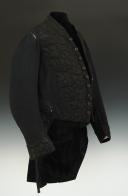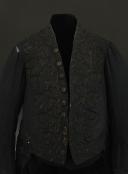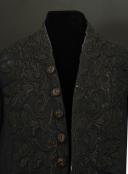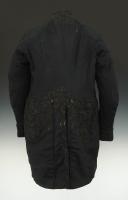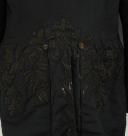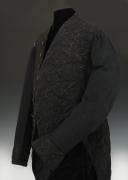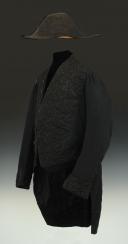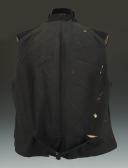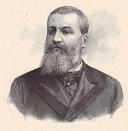
HAT, SUIT, VEST, CEREMONY PANTS SET that belonged to MAGISTRATE Jules LEGOUX, Second Empire. 24052
Sold out
HAT, SUIT, VEST, CEREMONY PANTS SET that belonged to MAGISTRATE Jules LEGOUX, Second Empire.
BICORNE HAT in taupe felt trimmed in the upper part of its two horns with a black plumetis. Black silk ribbon. Wooden button sheathed in black velvet embroidered with oak leaves in black silk thread, diameter 2.3 cm. Black velvet braid embroidered with oak and olive leaves in black silk thread. Cockade in tricolor trimmings. Inner headdress made up of a cream calfskin headband and an ivory silk headdress marked with gold hot iron "FONTAINE COSTUMIER DU TRIBUNAL 14 PLACE DAUPHINE PARIS" and the initials "JL" in gilded metal. Good condition cap with foxing.
Ceremonial DRESS in black velvet, straight cut at the front, closing by means of a hook and a clip at the waist, with 8 false buttonholes and wooden uniform buttons covered with black velvet embroidered with leaves of oak in black silk threads. Straight cut facings. The coat is richly embroidered in black silk threads with olive leaves, oak leaves and arabesques at the level of the breastplate, the collar, the facings, the waist knot, the false back pockets. Black silk lining. Very good condition, some small wear and accidents.
VEST in black cloth edged with a baguette with foliage in black silk threads. Straight pockets. Closing straight at the front with 5 buttonholes at the bottom. Back in light black canvas. Lined with white canvas. Good condition, back sheet with moth holes.
Straight PANTS in plain black cloth. Interior lining in ivory canvas. SILK label 'Belle jardiniere paris'. Good condition.
France.
Second Empire.
Very good state.
NOTE :
The engraving and the portrait of Jules LEGOUX are not available for sale.
BIOGRAPHY :
Baron Émile-Bernard-Jules Legoux, born in Saint-Amand-Montrond on November 16, 1836 and died in Bar-sur-Seine on April 20, 1908, was a French magistrate, man of letters and politician. He was one of the leaders of the Bonapartist party in the 1890s.
Family
Born in Saint-Amand, rue Lafayette, Jules Legoux is the grandson of Bernard Legoux (1763-1845), attorney general at the courts of Dijon, Genoa then Paris, created baron on April 12, 1813. This title of nobility was confirmed by letters patent of Louis XVIII of November 11, 1814.
Jules was the son of Julien-Camille Legoux (1802-1876), then prefect of Aude, and Laure-Julie-Alexandrine Monginet (v.1816-1888), from the Champagne family of Monginet-Berthelin.
On June 7, 1864, Jules Legoux married Lucie-Caroline-Eugénie Chausson, daughter of Henri Chausson, a Champagne wine merchant. Their daughter, Marguerite-Juliette-Marthe, born in 18654, married in 1888 Gabriel-Yves-Olivier-Jean-Marie, viscount (then count) of La Poëze (1861-19..), mayor of La Rabatelière (Vendée).
Career and tenure
After being a student at the Bonaparte high school, Jules Legoux obtained a law degree.
Lawyer attached to the public prosecutor's office in Paris, he began his career in the judiciary at the age of 25, when he was appointed substitute imperial prosecutor in Sainte-Ménehould by a decree of August 22, 1862. He performed the same duties in Épernay (decree of December 26, 1863), before becoming imperial prosecutor in Avallon (decree of January 9, 1869) then in Corbeil (decree of July 3, 1869). The Germans having invaded Corbeil during the Franco-Prussian War of 1870, Legoux refused to fulfill his duties despite threats of imprisonment, stating that "never [he] will enforce French law under the pressure of Prussian bayonets". . A few years later, he was appointed public prosecutor in Chartres (decree of January 27, 1876).
In November 1877, he became the chief of staff of his friend François Lepelletier, appointed Keeper of the Seals in the short-lived Gaëtan de Rochebouët government. After the latter's fall, Legoux retired from the bench.
On January 23, 1881, he succeeded Charles-François Pigeaster as mayor of Chapelles-Bourbon, a village in Seine-et-Marne, where his father-in-law acquired the castle and the Beaumarchais estate in 1870. It was under his mandate that the current town hall of the commune is built according to the plans of Jules Marmottin, architect of Coulommiers. Legoux published a monograph of Chapelles-Bourbon in 1886.
Political activities
Bonapartist activist, supporter of Prince Victor, Jules Legoux presented himself in the Porte-Dauphine district on the occasion of the municipal elections of 1887. Preceded by more than 300 votes in the first round by the outgoing municipal councilor, the radical Ernest Deligny, the baron is defeated in the second round.
Two years later, on the occasion of the legislative elections of 1889, he stood as a candidate in the 2nd constituency of Troyes with the investiture of the Boulangists, campaigning alongside Millevoye and Laisant. In the first round, he came third, with 2,544 votes, behind the radical Arbouin, editor-in-chief of Le Petit Troyen (3,353 votes), and far behind the opportunist Eugène Rambourgt (5,676). Arbouin withdraws but is replaced by another radical, Jules Charonnat, outgoing deputy beaten in the first round in the constituency of Nogent-sur-Seine. This division of the Republicans does not, however, benefit Legoux, who does not progress in the second round, obtaining only 2,050 votes, behind Charonnat (4,778 votes) and Rambourgt (elected with 5,757 votes).
In 1890, Baron Legoux succeeded General du Barail as chairman of the imperialist (then “plebiscitary”) committees of the Seine, a structure where he had been Prince Victor’s delegate since June 1889. On November 4, 1894, he took over the management of a weekly newspaper, Le Plébiscite (formerly Le Signal français, monitor of the imperialist committees of France).
A member of the Association of Parisian Journalists from 188816, he also collaborated, under his initials or under various pen names, with La Patrie, Courrier du Pas-de-Calais, L'Ordre, Le Peuple français (1879), to the Moniteur de la Semaine, to the Révisionniste, to the Petit Corporal, to L'Aigle, to L'Appel au peuple, to the Jockey and to the Intermediary of researchers and curious people. In addition to these press articles, he is also the author of several sketches and studies of manners. He is a member of the Society of Men of Letters.
Regularly re-elected in his militant functions, he was however little obeyed by the little united and little disciplined Bonapartists.
During the Dreyfus affair, the Bonapartists (represented by Baron Legoux - a member of the Action Committee set up by Déroulède - during the secret talks held at Fort Chabrol in June 1899), the Rochefortists and other declared enemies of the regime were as for them spared, as well as the officers. The Ligue de la patrie française (LPF), which has been inactive for several months and overtaken on its right by the dissidence of Action Française, is not targeted either.
Baron Legoux was worried during the government's repression of the anti-Dreyfusard movement, undergoing a search and a trial, then he took part in a vain attempt to unite the nationalist and monarchist leagues (June 21, 1899).
On July 6, 1902, Baron Legoux retired and resigned from his post. He was replaced by Léon Chandon after the refusal of Charles Faure-Biguet, the latter not wanting to interfere with his father, General Faure-Biguet, recently appointed military governor of Paris by Émile Loubet.
Jules Legoux died on April 20, 1908 at No. 160 Grande-Rue in Bar-sur-Seine.
Among his distinctions, we can note those of Academy Officer, Commander of the Order of Medjidié and of the Order of Isabella the Catholic, Grand Officer of the Nichan Iftikhar, as well as the ranks of Knight of the Orders of Saints Maurice and Lazarus, Vasa and Our Lady of Guadalupe.
Bibliography
THIS. Curinier, National Dictionary of Contemporaries, t. I, Paris, General Office of Bookstore and Printing, 1899, p. 235-236.
Bertrand Joly, Political History of the Dreyfus Affair, Paris, Fayard, 2014, p. 244, 519 and 583.
Louis de Magny, Universal Nobiliary of France, vol. XV, Paris, Archives of the nobility, 1880, p. 116-121.
Joseph Uzanne, Contemporary Figures from the Mariani Album, vol. V, Paris, Henri Floury, 1900, p. 131-133 read online on Gallica.
BICORNE HAT in taupe felt trimmed in the upper part of its two horns with a black plumetis. Black silk ribbon. Wooden button sheathed in black velvet embroidered with oak leaves in black silk thread, diameter 2.3 cm. Black velvet braid embroidered with oak and olive leaves in black silk thread. Cockade in tricolor trimmings. Inner headdress made up of a cream calfskin headband and an ivory silk headdress marked with gold hot iron "FONTAINE COSTUMIER DU TRIBUNAL 14 PLACE DAUPHINE PARIS" and the initials "JL" in gilded metal. Good condition cap with foxing.
Ceremonial DRESS in black velvet, straight cut at the front, closing by means of a hook and a clip at the waist, with 8 false buttonholes and wooden uniform buttons covered with black velvet embroidered with leaves of oak in black silk threads. Straight cut facings. The coat is richly embroidered in black silk threads with olive leaves, oak leaves and arabesques at the level of the breastplate, the collar, the facings, the waist knot, the false back pockets. Black silk lining. Very good condition, some small wear and accidents.
VEST in black cloth edged with a baguette with foliage in black silk threads. Straight pockets. Closing straight at the front with 5 buttonholes at the bottom. Back in light black canvas. Lined with white canvas. Good condition, back sheet with moth holes.
Straight PANTS in plain black cloth. Interior lining in ivory canvas. SILK label 'Belle jardiniere paris'. Good condition.
France.
Second Empire.
Very good state.
NOTE :
The engraving and the portrait of Jules LEGOUX are not available for sale.
BIOGRAPHY :
Baron Émile-Bernard-Jules Legoux, born in Saint-Amand-Montrond on November 16, 1836 and died in Bar-sur-Seine on April 20, 1908, was a French magistrate, man of letters and politician. He was one of the leaders of the Bonapartist party in the 1890s.
Family
Born in Saint-Amand, rue Lafayette, Jules Legoux is the grandson of Bernard Legoux (1763-1845), attorney general at the courts of Dijon, Genoa then Paris, created baron on April 12, 1813. This title of nobility was confirmed by letters patent of Louis XVIII of November 11, 1814.
Jules was the son of Julien-Camille Legoux (1802-1876), then prefect of Aude, and Laure-Julie-Alexandrine Monginet (v.1816-1888), from the Champagne family of Monginet-Berthelin.
On June 7, 1864, Jules Legoux married Lucie-Caroline-Eugénie Chausson, daughter of Henri Chausson, a Champagne wine merchant. Their daughter, Marguerite-Juliette-Marthe, born in 18654, married in 1888 Gabriel-Yves-Olivier-Jean-Marie, viscount (then count) of La Poëze (1861-19..), mayor of La Rabatelière (Vendée).
Career and tenure
After being a student at the Bonaparte high school, Jules Legoux obtained a law degree.
Lawyer attached to the public prosecutor's office in Paris, he began his career in the judiciary at the age of 25, when he was appointed substitute imperial prosecutor in Sainte-Ménehould by a decree of August 22, 1862. He performed the same duties in Épernay (decree of December 26, 1863), before becoming imperial prosecutor in Avallon (decree of January 9, 1869) then in Corbeil (decree of July 3, 1869). The Germans having invaded Corbeil during the Franco-Prussian War of 1870, Legoux refused to fulfill his duties despite threats of imprisonment, stating that "never [he] will enforce French law under the pressure of Prussian bayonets". . A few years later, he was appointed public prosecutor in Chartres (decree of January 27, 1876).
In November 1877, he became the chief of staff of his friend François Lepelletier, appointed Keeper of the Seals in the short-lived Gaëtan de Rochebouët government. After the latter's fall, Legoux retired from the bench.
On January 23, 1881, he succeeded Charles-François Pigeaster as mayor of Chapelles-Bourbon, a village in Seine-et-Marne, where his father-in-law acquired the castle and the Beaumarchais estate in 1870. It was under his mandate that the current town hall of the commune is built according to the plans of Jules Marmottin, architect of Coulommiers. Legoux published a monograph of Chapelles-Bourbon in 1886.
Political activities
Bonapartist activist, supporter of Prince Victor, Jules Legoux presented himself in the Porte-Dauphine district on the occasion of the municipal elections of 1887. Preceded by more than 300 votes in the first round by the outgoing municipal councilor, the radical Ernest Deligny, the baron is defeated in the second round.
Two years later, on the occasion of the legislative elections of 1889, he stood as a candidate in the 2nd constituency of Troyes with the investiture of the Boulangists, campaigning alongside Millevoye and Laisant. In the first round, he came third, with 2,544 votes, behind the radical Arbouin, editor-in-chief of Le Petit Troyen (3,353 votes), and far behind the opportunist Eugène Rambourgt (5,676). Arbouin withdraws but is replaced by another radical, Jules Charonnat, outgoing deputy beaten in the first round in the constituency of Nogent-sur-Seine. This division of the Republicans does not, however, benefit Legoux, who does not progress in the second round, obtaining only 2,050 votes, behind Charonnat (4,778 votes) and Rambourgt (elected with 5,757 votes).
In 1890, Baron Legoux succeeded General du Barail as chairman of the imperialist (then “plebiscitary”) committees of the Seine, a structure where he had been Prince Victor’s delegate since June 1889. On November 4, 1894, he took over the management of a weekly newspaper, Le Plébiscite (formerly Le Signal français, monitor of the imperialist committees of France).
A member of the Association of Parisian Journalists from 188816, he also collaborated, under his initials or under various pen names, with La Patrie, Courrier du Pas-de-Calais, L'Ordre, Le Peuple français (1879), to the Moniteur de la Semaine, to the Révisionniste, to the Petit Corporal, to L'Aigle, to L'Appel au peuple, to the Jockey and to the Intermediary of researchers and curious people. In addition to these press articles, he is also the author of several sketches and studies of manners. He is a member of the Society of Men of Letters.
Regularly re-elected in his militant functions, he was however little obeyed by the little united and little disciplined Bonapartists.
During the Dreyfus affair, the Bonapartists (represented by Baron Legoux - a member of the Action Committee set up by Déroulède - during the secret talks held at Fort Chabrol in June 1899), the Rochefortists and other declared enemies of the regime were as for them spared, as well as the officers. The Ligue de la patrie française (LPF), which has been inactive for several months and overtaken on its right by the dissidence of Action Française, is not targeted either.
Baron Legoux was worried during the government's repression of the anti-Dreyfusard movement, undergoing a search and a trial, then he took part in a vain attempt to unite the nationalist and monarchist leagues (June 21, 1899).
On July 6, 1902, Baron Legoux retired and resigned from his post. He was replaced by Léon Chandon after the refusal of Charles Faure-Biguet, the latter not wanting to interfere with his father, General Faure-Biguet, recently appointed military governor of Paris by Émile Loubet.
Jules Legoux died on April 20, 1908 at No. 160 Grande-Rue in Bar-sur-Seine.
Among his distinctions, we can note those of Academy Officer, Commander of the Order of Medjidié and of the Order of Isabella the Catholic, Grand Officer of the Nichan Iftikhar, as well as the ranks of Knight of the Orders of Saints Maurice and Lazarus, Vasa and Our Lady of Guadalupe.
Bibliography
THIS. Curinier, National Dictionary of Contemporaries, t. I, Paris, General Office of Bookstore and Printing, 1899, p. 235-236.
Bertrand Joly, Political History of the Dreyfus Affair, Paris, Fayard, 2014, p. 244, 519 and 583.
Louis de Magny, Universal Nobiliary of France, vol. XV, Paris, Archives of the nobility, 1880, p. 116-121.
Joseph Uzanne, Contemporary Figures from the Mariani Album, vol. V, Paris, Henri Floury, 1900, p. 131-133 read online on Gallica.
Reference :
24052
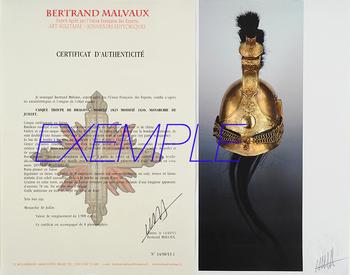
Next update Friday, april 4th at 1:30 PM
FOR ALL PURCHASES, PAYMENT IN MULTIPLE CHECKS POSSIBLE
bertrand.malvaux@wanadoo.fr 06 07 75 74 63
An authenticity certificate of the item including the description published on the site, the period, the sale price, accompanied by one or more color photographs is automatically provided for any item priced over 130 euros. Below this price, each certificate is charged 5 euros.
Only items sold by me are subject to an authenticity certificate, I do not provide any expert reports for items sold by third parties (colleagues or collectors).

